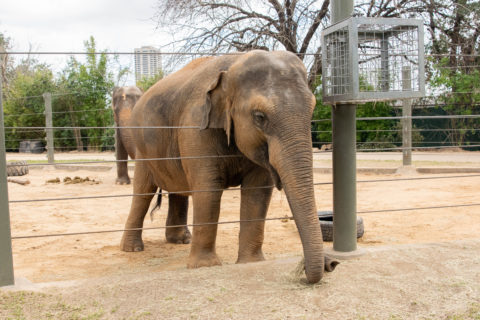An Update on Elephant Tupelo’s Pregnancy

Many Houstonians remember when Tupelo the Asian elephant was born in 2010, and might think she’s too young to have a baby! But this just isn’t the case. While a human is still a child at 10 years old, a 10-year-old elephant is an adult.
In the wild, elephants have been known to have their first calf as early as seven. It all depends on their reproductive maturity. When that happens, it’s important for the elephant’s long-term health to have a calf soon after they start to cycle. For Tupelo, she started cycling about six years ago. And, since Tupelo is related to all the male elephants in the herd at the Houston Zoo, we needed science to help us out. Her calf is the result of artificial insemination. A bull elephant at another accredited zoo provided the donor sperm for Tupelo’s calf.
Our animal care team is excited about seeing Tupelo with her first calf this spring. She’s been an incredible big-sister to all the babies born after her, and she’s already been an excellent mother to her calf.
Over the next several years, our Zoo animal care team will watch the young elephant for signs of elephant endotheliotropic herpesvirus (EEHV). EEHV is the most devastating viral disease in elephants worldwide. It occurs in elephants in the wild as well as those in human care such as in sanctuaries and zoos.
The Houston Zoo is an integral part of finding treatments and developing management strategies for the virus. The Zoo’s veterinarians and elephant care team established a research collaboration in 2009 with herpes virologist Dr. Paul Ling at Baylor College of Medicine’s Department of Virology and Microbiology, which recorded significant advancements in the study of EEHV, and toward a vaccine.
The Houston Zoo’s EEHV testing methods, treatment protocols, and experience serve as a global elephant care resource and have contributed to saving elephant calves around the world.
Just by visiting the Houston Zoo, guests help save baby elephants and their families in the wild. A portion of each Zoo admission and membership goes to protecting wild elephants in Asia. The Zoo provides support, equipment, and training to satellite collar and track wild elephants in Asia. The Zoo’s Malaysian conservation team is now watching over and protecting three groups of wild elephants with babies in Borneo. The data collected from these groups will inform future national protection plans for elephants.
